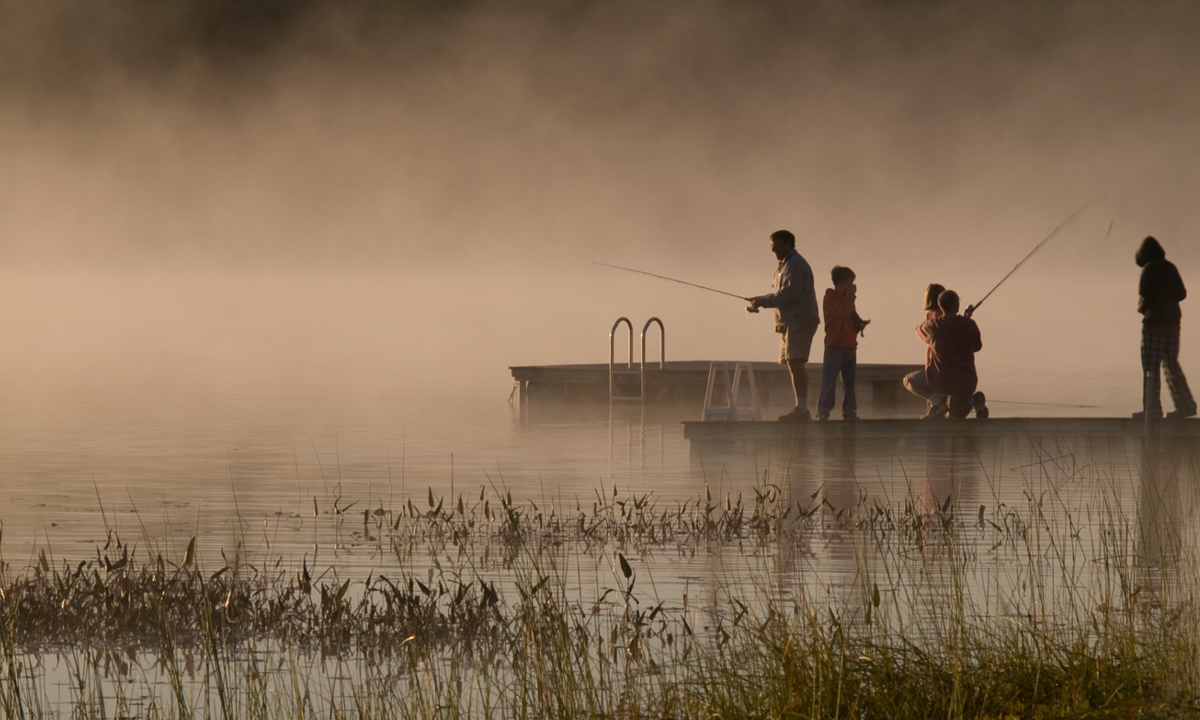At Pond King, we believe there isn't a video game on the market that can compete with sitting on the end of your dock, toes in the water, watching the sunset, or fishing with family on a misty early morning.
Let's face it, when it comes to making memories, there's no place better than down at the pond, and one of the best ways to fully utilize every aspect of your pond is to add a dock.
Docks offer a variety of enhancement opportunities for all types of recreation and practical uses.
Different Types of Docks
Once you decide it's time to add a dock to your lake or pond, the next thing to determine is which type of dock is suitable for your situation. Typically speaking, docks fall into one of two main categories: floating or fixed.
Floating Docks
Floating docks, as the name implies, float on top of the water.
Fixed Docks
Fixed docks are built above the waterline at a fixed height, hence their name, on a permanent foundation - typically made of concrete, steel, or wood.
Do You Need a Floating or Fixed Dock?
Several factors will help you decide if you need a floating or a fixed dock for your pond or lake.
Some of the key considerations include:
- the depth and type of the body of water
- the amount the water fluctuates
- the wave action of the body of water
- the profile of the shoreline
- the soil composition of the installation site and pond floor
- your intended use
Why Choose a Floating Dock
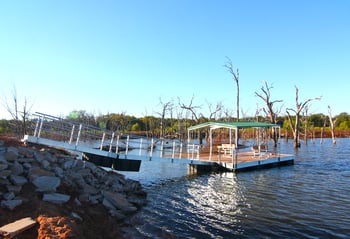
First, because floating docks are designed to float on the water's surface, they are ideal for ponds and smaller lakes where the water fluctuates, like ponds and lakes found in Texas and Oklahoma.
Many private ponds and lakes in these states are man-made to collect run-off, so the water level is dependent on the weather and often fluctuates 10 feet or more.
Drawbacks of a Stationary Dock in North Texas and Southern Oklahoma
With a stationary dock, when the water drops, you'll end up with a lot of air between your dock and the water - which can be problematic for swimming, fishing, and boating. Similar issues can exist if the water level of the pond increases.
A stationary dock can become a safety hazard or even unusable if the water level surpasses the dock's height during a storm or a particularly heavy rainy season.
For all these reasons, if your water level fluctuates, a floating dock may be just right for you.
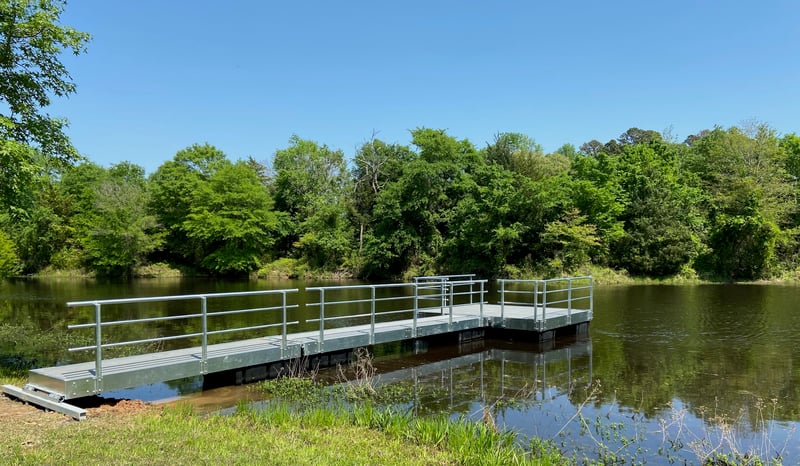
Of course, even if your lake doesn't fluctuate much, a floating dock still might be appropriate for you.
For example, if the water where you want your dock is very deep, it could be pretty expensive and complicated to build a fixed dock. If the floor of the lake or pond is silty, you'll have the same problem.
To build a fixed dock, you need a strong, immovable foundation. The deeper the water or the looser the soil, the more expensive and challenging it'll be to construct a stationary dock.
So, even if the water elevation doesn't fluctuate, you'll probably want to consider a floating dock if this describes your pond or lake.
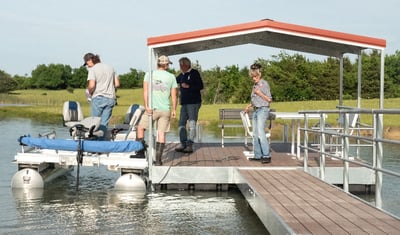
It goes without saying that how you plan to use your dock is a key piece of the puzzle when choosing between a floating or fixed dock. Since floating docks sit on the water, they make great fishing platforms because they provide easier access for pulling in your fish.
Too much space between the water and the dock makes it more difficult to retrieve your fish, and that could contribute to a story about how the big one got away.
Moor your Boat Easy with a Floating Dock
A floating dock is also a great option if you'll use it for tying your boat because the boat will always be the same relative distance from the cleats and ties. Because your boat will always be the same relative distance to the dock, you'll have an easier time securing the boat, and you'll have a consistent experience getting in and out of it, too.
You'll also want to consider a floating dock if you're concerned about the dock's long-term durability and safety and its impact on the body of water's ecosystem.
Long Term Issues with Stationary Dock Structures
When you build a stationary dock, the supports will be underwater, creating two potential issues.
- The first is that steel or wood pilings used to support a fixed dock start to degrade as soon as they are installed.
- With the support structure being underneath the water, a pond owner can never really know the condition of their stationary dock.
- The second issue is that when a stationary dock is built, it is constructed on the water with a steel or wood framework and coated with paint or sealant.
- Over time, the water will deteriorate the paint, corrode the steel, and the wood will begin to splinter and rot.
- Without regular maintenance, you could be looking at safety issues, both above and below the water's surface.
When to Consider a Fixed Dock
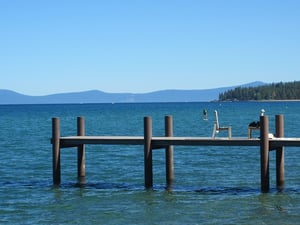
Floating docks aren't really suitable for bodies of water that have a lot of movement - either from current or waves.
If your installation site is near a tributary or on lake where there is a lot of boating activity, you should consider a fixed dock.
Additionally, a floating dock may sway some. While the floating dock's construction, size, and floatation devices can minimize the amount of motion, you should consider a fixed dock if you require absolutely no movement.
If you are looking to add a dock to your riverfront property, or if the body of water is pretty shallow, a fixed dock is a better option.
Floating docks are typically secured only at the shoreline and, without pole guides or outriggers, a river's current could eventually compromise the bank mount.
Or if the water is shallow, say less than 5 feet, a floating dock could end up resting on the lakes' floor, so if this describes your situation, opt for a fixed dock.
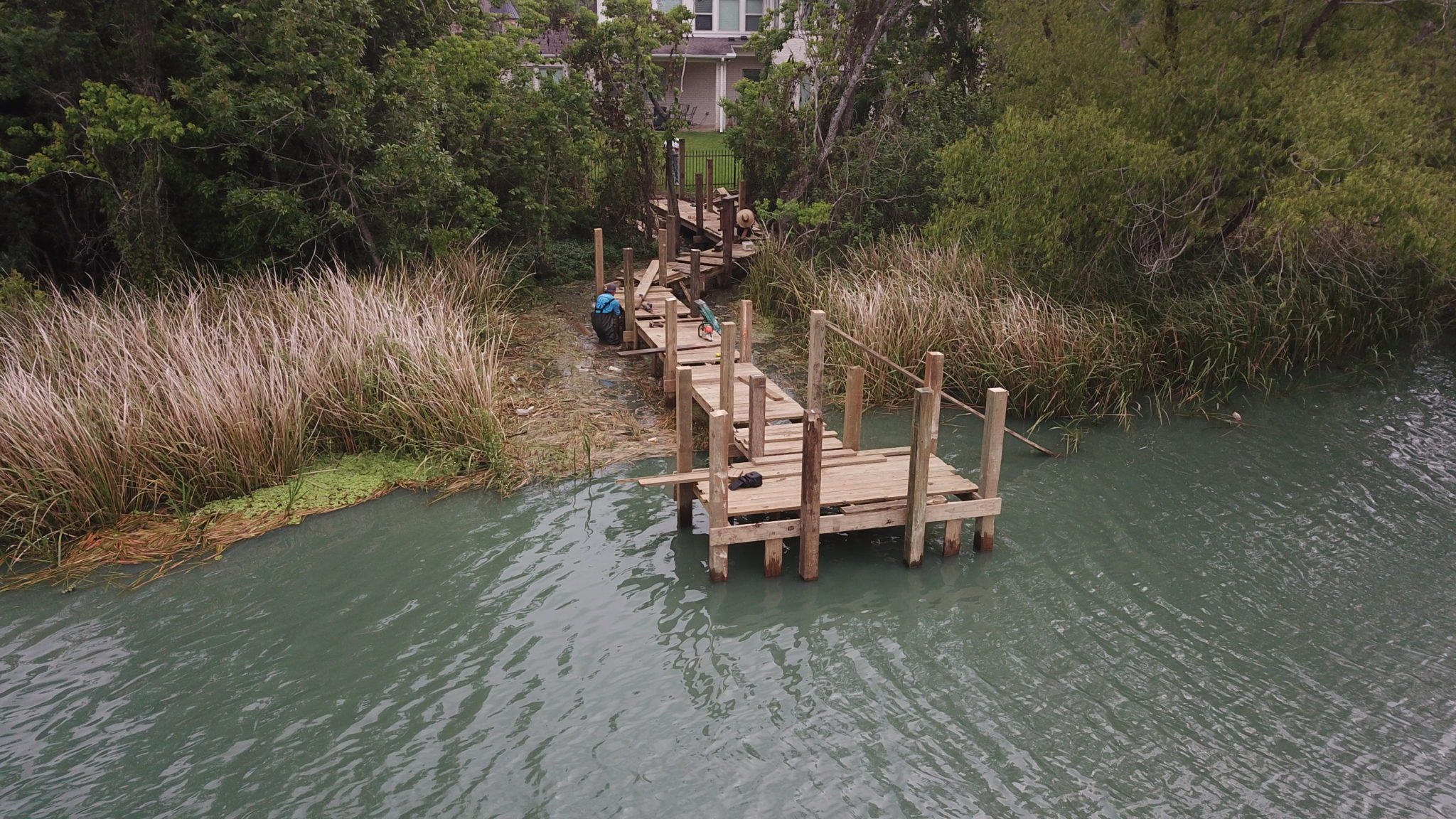
If there is limited access to the installation site or the installation site is extreme - either very steep or rocky - you may need to go with a fixed dock.
If access is limited, it may be easier to haul in the materials and build the fixed dock on site. Since floating docks have limited terrestrial contact points, they aren't always well suited for extreme terrain.
Building Your Dock
Once you've decided between a fixed or floating dock, the next thing you need to figure out how you are going to build it.
More accurately, you have to decide if you will build it, pay someone else to, or buy it already assembled.
Sounds easy, but this can be a pretty stressful step. Budget, time, and capabilities will be the main drivers in determining which route is right for you. If budget is your primary consideration, you may opt to build your dock yourself.
Even if you are pretty handy, constructing a fixed dock is a rather specialized project requiring special equipment. If you are already too busy with work and life's other challenges, hiring the job out to a professional is probably a pretty good option.
However, finding a reputable contractor is sometimes easier said than done. Sometimes it just makes sense to buy a dock that is already manufactured so you'll know the design and construction are tried and true.
In any of these scenarios, materials will be another factor.
Contact Pond King about Choices for Your Pond’s Floating Dock
If you have questions about which type of dock is right for you, or if you need help designing the perfect floating dock for your situation, don't hesitate to contact ust or call today to speak to a team member!
Our goal is to help you get more from your down at the pond experiences!
We hope to see y'all down at the pond!


